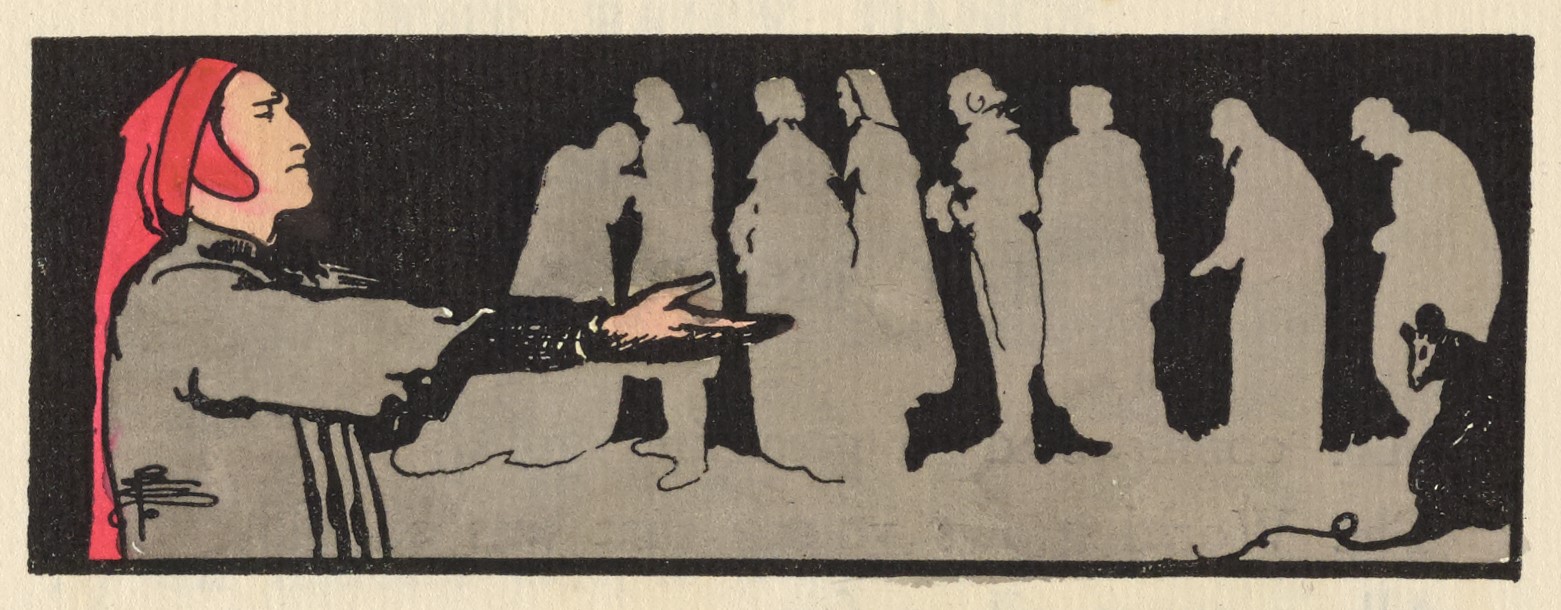THE LAMENT OF A LYCEUM RAT.
“Yes,” said the last rat, “they say that rats leave the sinking ship; so
they do—another trait in common with humanity. Why? Because
both men and rodents must live! For though the necessity for our
existence does not seem obvious to men, it is so to a far higher power,
and therefore we live and seek the means withal.
“I am the last rat left here. I had hoped to find shelter in the
Lyceum to the end, but,” he said abruptly, “I am starving.” He leapt
to the edge of the dress circle where I sat gloomily gazing at the deserted
stage.
“Ravenous, I roamed over the house just before dawn. All I could
find to gnaw was a fragment of hare’s-foot and an old grease rag which
some of you people had left on departing. I crept down again cold and
weary, when suddenly the old familiar staircase seemed thronged with
crowds of men and women and little children all hurrying away. I
crouched in fear, but they did not touch me nor heed me in any way.
“Brave men in armour, priests, lovers, fair girls, witches, nuns,
dancers—a whole rabble of beings from every page of history and
romance—they rushed past me like the eddies of a strong tide, flowing
rapidly away and out into the night. Then as they left me, scared and
The Green Sheaf
trembling, I raced across the stage that was filled with a light subdued but
intensely clear, and once more I looked upon Hamlet, Shylock with
sweet Portia, Mephistopheles with Margaret and the ill-fated Faust, The
Vicar with the Squire and lovely Olivia, incomparable Beatrice and
Benedick, the Martyr King with his Queen and Cromwell, Macbeth,
Napoleon, the bloodthirsty Louis XI., the tortured Matthias, Robespierre,
Richelieu, and countless others. And the old house glowed and breathed
The Green Sheaf
again in their gracious presence, but where as all that motley rout that had
fled away bore in their eyes a look of expectancy, restlessly trying to read
the future, these all seemed rapt and calm and full of peace.
“Suddenly the shapes all bowed down, swaying like trees before the
autumn winds, and a tall form appeared before them—Dante! They made
way, fell back and left him—left him standing alone. Then he spoke:
‘May I not join you, O my comrades?’ And he stretched out his
hands toward them in greeting.
“But they bowed again and answered with mournful voices, ‘No,
Master, you have fresh fields to fight—fresh victories to gain. Here only
memories can live, and like memories we must cling here until your magic
hand shall beckon us to life again. You alone can call us back. Go,
Master! Hope shall not leave you, but will lead you forth that you may
give to the world yet another creation. Bid Dante live at your bidding,
even as we lived; human that mankind may love ; divine that souls may
be lifted nearer to Heaven.’
“Then the Master turned and went, Courage and Hope beside him,
though Sorrow fell weeping at his feet. … This,” said the last
rat, “is the vision I saw last night. I leave my home and its dear
memories, for even I must live my life.” A ray of sunshine strayed in
and he vanished seeking the darkness, while sadly I wandered out into
the light.
Mary Brown.
MLA citation:
Brown, Mary. “The Lament of the Lyceum Rat,” illustrated by Pamela Colman Smith. The Green Sheaf, No. 5, 1903, pp. 8-10. Green Sheaf Digital Edition, edited by Lorraine Janzen Kooistra, Yellow Nineties 2.0, Toronto Metropolitan University Centre for Digital Humanities, 2022. https://1890s.ca/GSV5-brown-lyceum/

![GSV5-colman-smith-lyceum-illustration-p9 This half-page coloured illustration, centered above the text, appears on the second page of “The Lament of the Lyceum Rat,” by Mary Brown. Outlined in a black rectangular border in portrait orientation, the image depicts four figures in costume on a stage [likely in a performance of Victorian Sardous’ play on Dante]. The three standing figures face left, in profile, while the kneeling woman faces right. In the centre foreground, a man in a long gray robe and red medieval hat holds the hands of the woman who kneels at his feet. His pale face is the only one rendered in full colour; the faces and bodies of the other three figures are the same brown shade as the background. Behind him is a man wearing a crown, and holding a spear and golden shield. The gold shield appears to be a halo surrounding the head of Dante, the man in the red hat played by Henry Irving. These two male figures are followed by a woman in long robes carrying pink flowers, with a crown of flowers atop her head. Behind the figures, in the bottom left of the image, is a small doorway with a barred window. The artist’s monogram is at the bottom right of the frame.](https://1890s.ca/wp-content/uploads/GSV5-colman-smith-lyceum-illustration-p9.jpg)